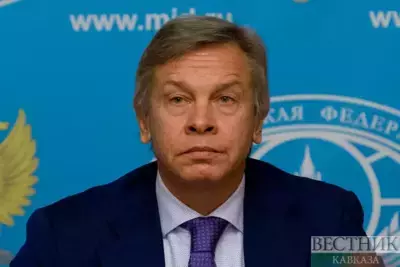Today the Prime Minister of Russia Dmitry Medvedev is speaking at a meeting of the Munich Security Conference. The meeting is dedicated to modern crises – the Syrian, Ukrainian, and migration crises. Participants in the conference are discussing the development of joint mechanisms of resistance to crises and cooperation on their settlement. At the beginning of his speech, Medvedev warned that he would have a more general, but useful speech. The head of the European Office of Vestnik Kavkaza, Orhan Sattarov, is at the conference in Munich and is reporting the latest news from the meeting.
“Since the end of the First Cold War, 25 years have passed. It is not much for history, but for individuals and even generations it is a significant period, which is sufficient to assess all our problems and failures together, define future goals, and of course avoidany repetition of mistakes.
The Munich conference is characterized by sharp and honest discussions. I am here for the first time. And I would like to speak about our, Russian, understanding of the modern situation in European security, because we have gathered here for this, and we see what the solutions for the problems we face are, considering the fact that they are complicated by the clear worsening of relations between Russia and the West,” the Russian Premier said.
He also spoke about Russia’s view on the system of European security: “Ahead of the trip to the conference, I met President Putin. We discussed his speech here in Munich in 2007. Then, he spoke about ideological stereotypes, double standards in international relations, which do not help to reduce tension, but to strengthen it. And the international community has fewer and fewer opportunities to take significant political decisions.
Let’s ask the question: didn’t we dramatize the situation then? Were our assessments too pessimistic?
Unfortunately, I should state that the picture is even more serious. Events have been developing more dramatically since 2007. There was no United Big Europe then; and there isn't one today. Our economies, all economies, are growing poorly. Conflicts in the Middle East countries and North Africa became sharper. A migration collapse took place. Relations between the Eurasian Union and Russia have been spoiled. Civil war is taking place in Ukraine.
From this point of view, our intensive dialogue on the future architecture of European-Atlantic security, on global stability, on regional threats, is especially necessary today. I believe it is abnormal that the dialogue has been broken in so many directions. Almost everybody admits the problem of communications – both in Western Europe and in Russia. Mechanisms which enabled us to eliminate mutual concerns have been paralyzed.
Moreover, we have lost the culture of mutual control over arms, even though it has been the basis for strengthening of respect for a long time.
Partnership initiatives which cost us a lot of effort are dying one after another. Actually, the project of the European security agreement is frozen. The idea of establishing a committee for foreign political and security issues, which I discussed with German Chancellor Angela Merkel in Meseberg, has failed.
We believe that the political line of NATO toward Russia is still unfriendly and closed. I can say even sharper: in fact we have returned to the time of a new Cold War. Almost every day we are declared to be the most dangerous threat to NATO in general or separately for Europe, the US, and other countries (my colleague Mr. Stoltenberg has already demonstrated this). They shoot threatening movies in ww the Russians start a nuclear war. Sometimes I think: are we living in 2016 or in 1962?
However, the real threats which exist in our little world, and I hope everyone understands this, are quite different.
The notion of 'European security' covers a wider field than we had always thought. Forty years ago, we spoke about the military-political relations of European countries. But today other problems are urgent – stable economic development, problems of inequity, poverty, unprecedented migration, new forms of terrorism, regional conflicts, including internal European ones. Of course, I mean Ukraine and the unrest Balkans, as well as Moldova, which is on the verge of a national crisis.
Those cross-border challenges and threats, which seemed settled to us in some period, have appeared with new force. And the new threats such as terrorism and extremism have lost the abstract nature which they had for the majority of people. Today it is a reality for millions of people in various countries, Mr. Valls has spoken about it. It is an everyday threat. A plane may be exploded or someone may shoot in a café every day. Previously, it took place in the Middle East only. Today it is happening all over the world.
We can see that economic, social and military challenges mutually strengthen each other. And we act absolutely separately, flabbily, only considering our national interests, or we accuse another country immediately,” Medvedev said.
According to him, traditional schemes don’t work in the economy; political interests prevail over economic calculations. Talks on establishing large-scale economic mega-blocs are being held. “Even small shifts in the economy of a country directly affect general financial markets; from this point of view, globalization has played a low-down trick. The energy market is very unstable; both importers and exporters suffer from its volatility. Sanctions are being imposed, contrary to international law. Sanctions hurt even those countries which impose them on others. A lot of international initiatives have been frozen because of sanctions.
Are our confrontations worth it? Do any of you sitting in this hall need this? This is a road to nowhere.
European politicians thought that establishing “a belt of friends” along their borders would provide them with a security system. However, in fact we see a series of failures in the eastern and southern wings of the European policy of neighborhood. These are our common problems now,” the Russian Premier said.
To be continued
















